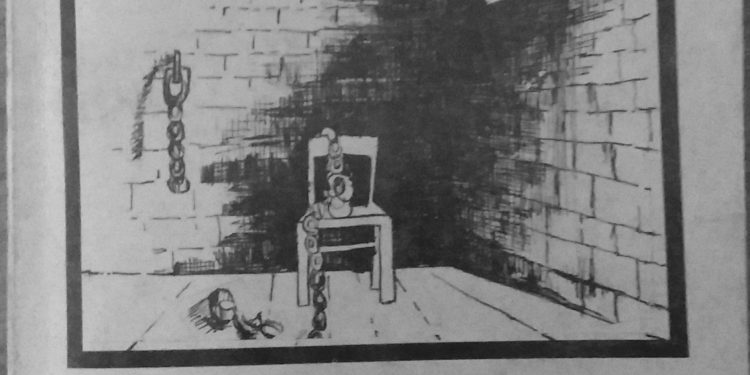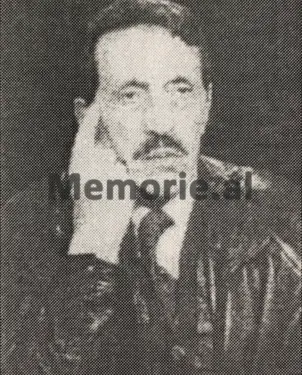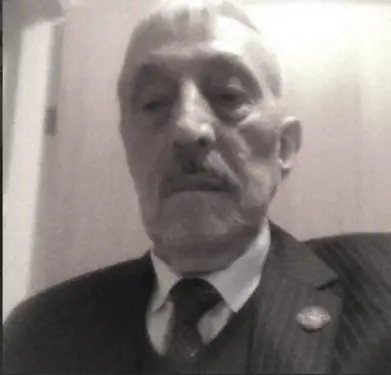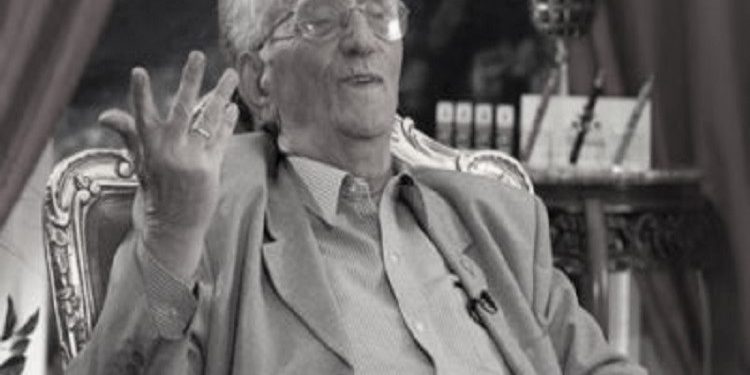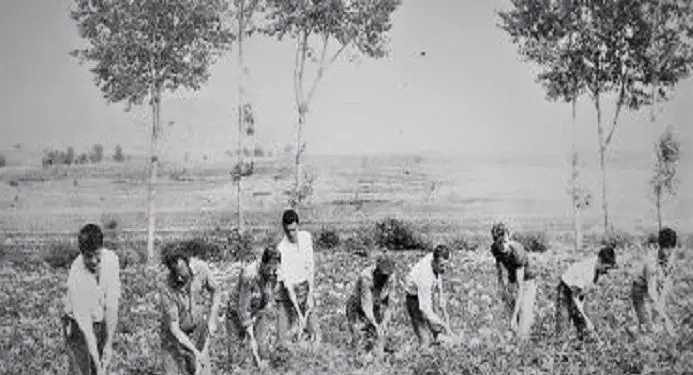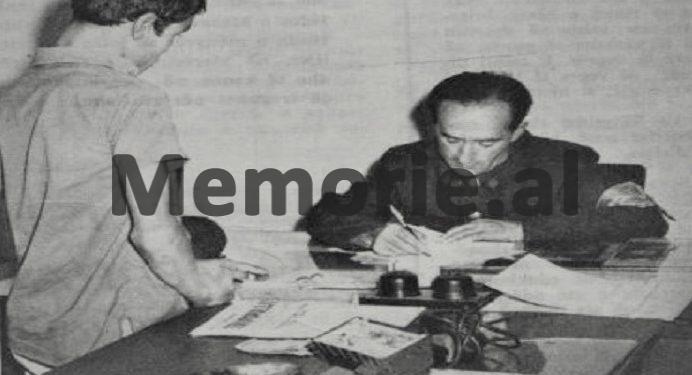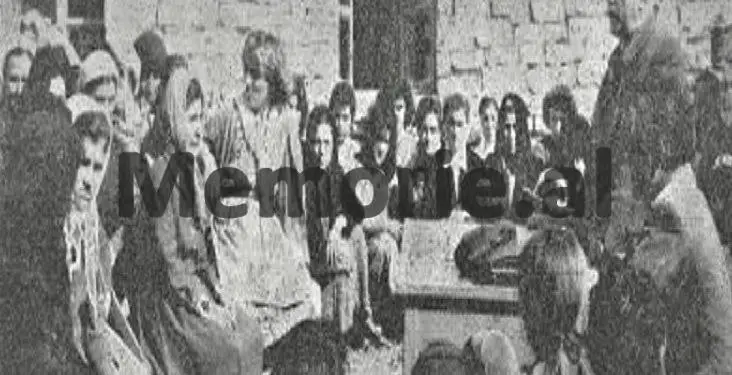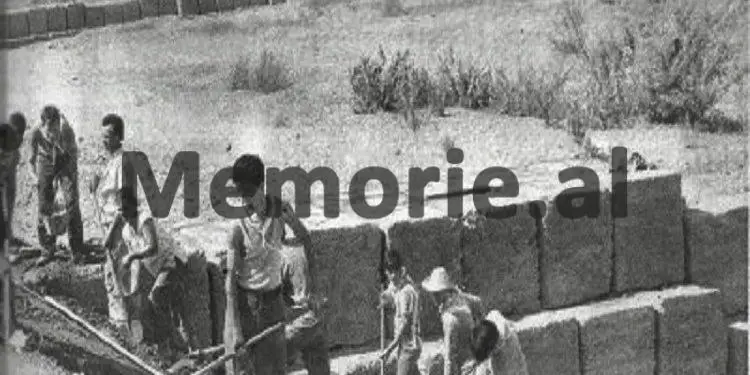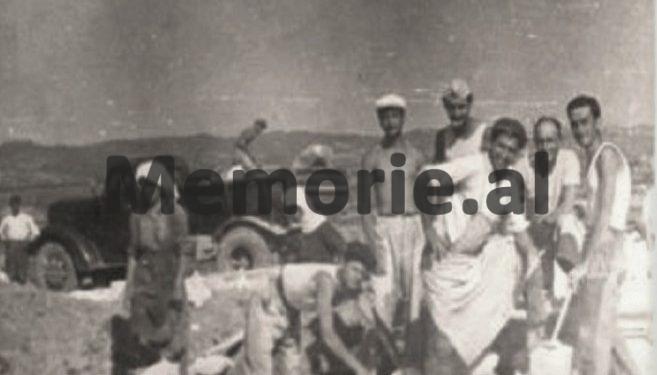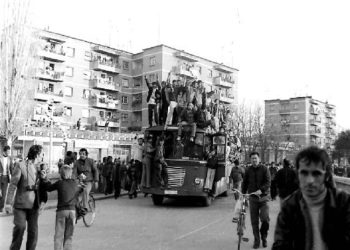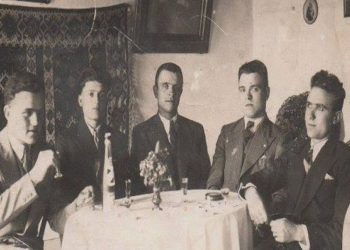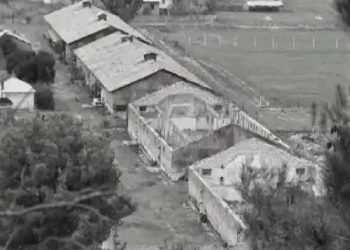Nazmi Berisha (Dyzi)
Second part
Memorie.al publishes the unknown story of Nazmi Berisha, originally from the village of Llap in the Municipality of Podujeva in Kosovo, who was seduced by the propaganda of the communist regime and the programs provided by Radio Tirana for “socialist prosperity” and escaping the rank-and-file methods of the Titoist regime, in 1960, he decided to flee and came to Albania, crossing the Buna River by swimming in the great cold of that harsh winter. The rare testimonies of Nazmi Berisha, how he was received in his homeland, where the soldiers and border officers of the Shkodra district, after tying him with wire, sent him to the Internal Affairs Branch, where for 24 hours they did not even give him bread for eaten, and then sent to the town of Shijak where was the “Filtering Center” of Kosovar emigrants. The whole adventure of the 20-year-old boy from Kosovo that the State Security accused of: being a UDB agent, who had sent on a secret mission, Cedo Topallovic, the president of the UDB for Kosovo, to meet with the Rear Admiral of the Fleet, Teme Sejko and the inhuman tortures inflicted on him in the Internal Affairs Branches of Lushnja, Kruja, Tirana, etc., where he was kept in isolation and asked to become a collaborator of the State Security, as witnesses, his compatriots from Kosovo, and his refusal, which made him spend 20 years in the prisons of the communist regime of Enver Hoxha. The articles published by Memorie.al, have been selected from his book, ’20 years in Enver Hoxha’s prisons’ published by the Publishing House “UEGEN”, Berat, 1995.
Note to the editor and publisher
Evidence of civic courage, living testimony of a completely heartless human suffering, an archive that is valid for today and tomorrow.
Prison scenes run in front of you, honest and cannibalistic characters, ordinary people and you are left stunned by such a low action, so without dignity and profane of the communist administration.
20 years in Enver Hoxha’s communist prisons! The author never equates the dictator with Albania. The total disappointment of a guy who ran towards the star of his love, is not obscured. Everyone had almost the same fate. An unparalleled patience, an unwavering will of a diverse psychology full of dramatic colors, a monstrous fatigue,
– Here is this book by Nazmi Berisha.
The characters are real.
Let each one prays to the God of truth.
Xhevahir Lleshi
Continues from the last number
Plus, you would go to work with the police and come back with them. Let any of us be missing! Sirens pierced the sky, villages were terrified by the alarm, and even the waves of the Adriatic Sea felt bad. I do not say no, you can get permission from the police to go to Lushnje.
One day, Hazir Haziri was allegedly caught with leeks in his hands. Paskej came out of the camp territory and so they brought him to us tied up beating him. I saw what I will never forget. The Chief of Police, Veli Kondi, had organized a family in Vuthaj, whose children spat in the faces of the convict, as well as Haziri. I was immensely shocked and meanwhile was searching, as a material thing, for the roots of my so romantic thought. A scene as rude as the one with Hazir, just like the ones I had seen in the Yugoslav courts, made you think a little thin.
The beast, named Veli Kondi, staged his own escape attempts. Enough to catch the eye. He was thus made as a perfect director to put on the stage of Çerma, macabre performances. I had never met another intriguer like Veli Kondi. An ordinary Jago of the Albanian police novel. – – Where, where did my thoughts go?
The victims of the Velikondi “escapes” were Sokol Jaha, Adem Gegaj, as well as many other Kosovars, whose names I do not remember after so many years. Meanwhile, endless questions were pouring in from all sides, an army of questioning janissaries holding swords and spears raised against me. Questions that got less and less answers every day. They followed me back to the sector, as I worked with a hoe and my eyes filled with tears. And I remembered my friends on tour and in the movies. At first, I was almost heartbroken. I wanted another schooling. I wanted to perfect myself intellectually!
Beautiful, here is Çerma, here is the hoe, perfect de, spordhjak. I saw myself with hatred and the guards of Veli Kond, this Cereber, with hatred. If you broke my heart, there would be no bloodshed but sorrow. And every day I was greeted by a woman-mother, neighbor with us in Prishtina, who was crying and mourning the little 3-month-old boy, who had died, and at that time I was wondering how a navel could be mourned so much. But now I was suffering, I alone was crying lazily with myself, my fate, my dreams, my anger that was growing day by day.
One day a young man in his thirties came to our concentration camp. He was a Kosovar, so we rushed to him, whoever was closer to him, whoever asked him about everything, to get information from his country. The young man’s name was Kapllan Resuli, already known to everyone, but then also to us in Kosovo, heard as a writer. I looked at Kapllani something far away and I felt sorry for him, as for myself.
However, I introduced myself to him and asked him to put me in my barracks. It was lucky for me that for a long time I lived with the great man and patriotic writer, Kapllan Resuli. He took honey out of his mouth, though what he was talking about was poison. After being imprisoned in Tetovo (where he had been a teacher) and sentenced to one year in Idrizovo, Macedonia, he said that: Adem Gajtani should have been a witness, but the same one who had appeared to many of his compatriots. Kapllani had asked Gajtan to help Adem Demaçi’s mother materially, without knowing that this man was a witness and a spy against Demaçi. Kapllani was married to a Tetovo woman, but after his imprisonment, Gajtani took his wife. Meanwhile, the other prisoners in Idrizovo had decided that Kapllani should escape to Albania and tell about the monstrosities of the Yugoslav UDB there.
My days and nights were filled with Kapllan Resuli. In Kosovo he was known by the surname Kallushi. It was this man who gave meaning and enrichment to my life back then. Kapllani, he was writing and a breeze hit me and I was feeling like another person was laughing. Despair seemed to fade, hope was strangely enlivening in my body. Even my doubts began to stay away from me, though nothing had changed in our gloomy lives.
I meanwhile remembered a wise word. History is built by powerful human personalities, and others follow them. Such was the arrival of Kapllan Resuli in Çermë. I was no longer that silent, powerless man, but I was another thing, another subject. I also started writing next to him and Kapllani gave me wings for other dreams. I was the first reader of Kapllan’s stories. I remember one of the stories, “Christ”, but it was not published. Censorship? Maybe. Except Kapllani was not discouraged. He continued to work as long as he was free with pen and white paper.
Kapllani told me about the Idrizovo prison. Merjema, a beautiful woman, who came and met her husband Hamza Shala, a Kosovar student who was suffering in prison for electrifying her village, Lagje. The Yugoslav authorities, with the help of a local Veli Kondiçi, set the scene for him, then a fugitive in Albania who was crazy. And as a conclusion – political prison. This was a real story, not an imagination like “Christ”, that the desolate mother had taken away Christ and put her son. Later, in prison, I learned that Kapllani had embodied his story of Mary and Hamza in his famous novel Betrayal. Maryam was the opposite of his Tetovo wife, who was married to the spy, Gajtan.
Those were turbulent years of Çermë (1960-1961). Albania broke with the Russians and emerged from their colonial dictatorship. We hoped that the westerly wind would not start blowing now. We had food and great hope: Albania’s independence floated above all waves and dilemmas.
It was a pain for me, as Resuli told about Idrizova. The Albanian prisoners there had greeted him like a hero, provided him with paper and pencil, washed his clothes, found his food, provided him with all services. Kapllani’s eyes were filled with longing, while a battered rage burst into my soul. What he was telling were great events for the honest man. What a soul that boils in the common man. Albanians were sent to prisons because they loved freedom, social justice and national education. So Rasul and his companions had to write, to make clear to the world everything that was happening. And what more can I say about Kapllan Resuli, his talent, his unwavering will, his creative plans, his bright mind and his bravery?
I was two years old in Çermë, and Kapllani was a newcomer. He perhaps surpassed with his creative genius the gloom, the daily banality, and therefore rose above the smallness and monotonous life of the camp. Meanwhile my despair had remained somewhere far away, on an unknown shore. It felt like I was breathing freer, like I was happier and more optimistic. My only concern was not continuing school, which I never stopped dreaming about. And my spiritual catalyst was Kapllan Resuli. He renewed me in the very moments of the great crisis, gave me his hand and lifted me from the abyss where I was sinking. My inner questions took flight, my dilemmas became even more distant.
Rasul seemed to take me by the hand and walk me through his dreams, as if I were a small child. My walks transcended a vast world, a fog that had to be overcome. I was fascinated by his humanitarian visions, by his boundless love for truth. One day, as I was returning from work, I was told to go to the police station in Lushnje. That was how heartless questions had to come to me. Why, I had taken a photo at the independence monument in Vlora a few days ago? Or why did I send the photo to Prishtina to my parents? Maybe for another photo when I went out barefoot during work in the summer that I had also started in Prishtina? My intention had been good.
I wanted to tell my parents that the monument of independence is sacred and for the other that the micro-bourgeois life in Albania is something surpassed. Then what had I done wrong? I reasoned sideways and I could not fit into it. There were times when I cried alone, but I did not share my thoughts with anyone. Do I not believe that I was guilty of reviving myself and losing my grief? The questions were not shared with me all the way the next day. And in the meantime, I convinced myself that the Albanian police was calling me and not the Yugoslav one. And this thought seemed to outline a kind of smile inside me. Numerous questions and futile tragedy of the situation were probably a consequence of my young and inexperienced age.
The person who was looking for me in the office came from the Ministry of Interior of Albania. That seemed to add to my doubts. However, I looked the messenger in the eye without hesitation. At that moment I felt calm. What was the need to be alarmed? Was I a man of panic, of forebodings, of…?
– “Sit down” the interlocutor spoke to me, even with a smile. I sit. The twinkling of his smile gave me courage. And of course, he asked me about the motive of my arrival in Albania, about the way it was done, about everything I had been asked before. It is understandable that I responded with my characteristic sincerity. I had nothing to hide, as had happened before. I was heartbroken that the ministers were liking what I was saying. Suddenly he stood up and said:
– Here, we value people like you, patriots, loyal soldiers of the homeland, its freedom and independence.
I had no choice but to rejoice. For the first time in Albania I heard such words. I was about to burst into tears from a kind of longing that rose up in my throat. It was an irresistible wave. So, this man of high authority was knowing how to separate the alum from the sugar! In the end he told me to go to Çermë, because with real patriots as I was I never had trouble …!
My return to Çermë was like a flight. Anyone could understand from there beyond my excitement. An inner voice caressed me. My sedra was congratulated. I can call myself happy. It occurred to me that after this conversation, I would surely be taken to school. There was no reason why it should not happen. And I was dreaming, I was even choosing the city where. Of course, I would like to be in Vlora, even though independence was declared there.
It is conceivable that my joy, all intimacy, I slapped Kapllani in the lap, as he lay cross-legged on the table of his inspirations. He caught my nerve and to get rid of me somehow, he read me something about Maryam of Idrizova. I could not even imagine myself expressing my deep feelings through the beloved character. Meanwhile the writer’s poetry seemed to be spoiling the poetry of my soul. That night I was nobody. I belonged to myself, to my selfish joy. Not even sleep could catch me with his wings. I saw with my eyes open a great sun like never before.
The next morning, I was informed that I had to go to the Lushnja Branch at around twelve o’clock. The road was already without a doubt, without worries. I was introduced to a young officer named Hajri. This officer pointed out to me the Party’s confidence in me, spoke at length about the intentions of the Yugoslav Titoists towards Albania, about vigilance and what else he did not speak about. From me, as a patriot and a man of faith, something was required, I had to inform about everything that happened in the camp, about the elements of non-faith, because among us there were agents of Yugoslavia.
So, he gave me a statement to sign. It was written my nickname “Beautiful Mountain” that from now on I was obliged to inform the Security, about which I heard talk against the Party of Albania. I had to sign the letters under a pseudonym. I signed the statement, as if stunned, but at that moment something tightened in my throat. Why did this have to happen that day? Why me? So, I would denounce the friends I ate and drank with! I was, meanwhile, convinced that no UDB envoy was in the camp. Everyone was remorseful, sad, longing, desperate. The worm sank into my consciousness: what if it were any? If I knew who I myself would notify about this even without signing that statement! What, then, is the purpose hidden?
I returned to Çermë. My soul was frozen with nails by the invisible cat with incomparable savagery. My heart was pounding with grief. I was nervous and extremely worried. Still without reaching out to friends, I felt disgust for myself! Me, the spy of friends! No, never ever! But you signed the statement without! Great job that I signed it! The hesitation to openly tell friends was great! These are other troubles for a new and undefiled soul. Shame on you, this is what happened. Or instant take? Maybe just a trap, and I minor fell hooked inside.
No, I could not bear it long. As soon as I found the volley, I told my friends, including Kapllan Resuli. Everyone told me to give up this humiliation. Security called a letter signed by me more than my willingness to give my life for the interests of Albania! Serious insult, really. Why didn’t I tell that to the officer? Curse and humiliation. The nation in my throat would not even let me breathe. What should I do? My friends of fortune and suffering meanwhile advised me to stay away from these jobs. Even if I was called to the police, I would not go. Here, that was all. Points.
It is my friends who saved me from my moral catastrophe. The statement was just an imposition and a letter so typed and with my signature I cannot offend my pride, my dignity. Because my heart spoke openly that day, the way. And this is an invincible statement! I was not late and I was called to the police. Then I submitted, with great composure, my judgment, I have not heard anything, I am not staying with anyone, I do not know what is being said, I am a prisoner and I am not allowed to go to school, because when I go to the barracks I fall asleep, etc.
And the officer got nervous, poison and bitterness became, yet he restrained himself. According to Officer Hajri, what patriot was I, huh? Yes, fellow officer, I am a patriot, not according to your box! I have the right to live with a clear conscience towards my friends…! After a month again in the Lushnja Branch. I went in a random car, without greeting friends. This was my parting with Kapllani! Oh God, I didn’t even think about it. I met Sali Shatri and Remzi Berber at the police station. I was acquainted with Sali in Shijak, while I saw the second one for the first time. Sali Shatri was from Istog / Istok. He wished me in Shijak “health and luck in Albania!”
To my surprise, Security questioned me again. Nothing to anyone’s curiosity. These were questions that are already well known. The eye of the questioners did not move. There was a mask on their faces. And I could not see what was going on in their souls. Longer minutes and even longer question and answer intervals. I had not even noticed that the one who asked me was Sali Shatri. The pallets were yellowed like autumn leaves. The eye was looking for something inside me. I waited sitting on the volcano. Nevrasteni. Excessive seriousness. Additional clarifications Superior dissatisfaction. After a while I was told I had to go with them. Where were they taking me like that?! /Memorie.al




